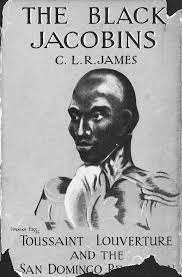[This piece was originally published in Wickerwork, the newsletter of the Southwick Society, and is reproduced here with the permission of the society].
C.L.R. James and the writing of The Black Jacobins in Southwick

The Black Jacobins (1938 cover).
The black radical Trinidadian historian and writer Cyril Lionel Robert James (1901-1989) was one of the twentieth century’s most remarkable Caribbean thinkers. He is perhaps best remembered as the author of two classic works – a semi-autobiographical cultural history of West Indian cricket, Beyond a Boundary (1963), and The Black Jacobins (1938) about Toussaint Louverture and the Haitian Revolution, which analysed the only successful mass slave revolt in human history, the transformation of colonized slave society of Saint-Domingue into the world’s first independent black republic outside of Africa from 1791-1804. In his native Trinidad, C.L.R. James also analysed calypso and Carnival, and helped pioneer the West Indian novel with Minty Alley (1936), recently republished by Penguin with an introduction by The Booker Prize 2019 winner Bernadine Evaristo, as well as playing his part in the anti-colonial struggle as a campaigner for “West Indian self-government”.
The Black Jacobins, in the words of Sudhir Hazareesingh, author of the prize-winning biography Black Spartacus: The Epic Life of Toussaint Louverture (2020) remains ‘the classic modern work in the English language’ on the Haitian Revolution. In 2016 the work was selected as the top work of ‘radical history’ ever written by the Guardian, and it also featured as no. 5 in a list of the top ten works on ‘black radicalism’ by the same publication in 2019. The work (and a portrayal of James himself) have also featured in the Small Axe series of films produced by the award-winning director Steve McQueen (BBC, 2020).
It has long been known that one key period in which James wrote The Black Jacobins was spent writing while residing on the South coast during 1937. In his 1938 Preface to the work, James describes how while the Spanish Civil War raged and he was writing the work, ‘it was in the stillness of a seaside suburb that could be heard most clearly and insistently the booming of Franco’s heavy artillery, the rattle of Stalin’s firing squads and the fierce shrill turmoil of the revolutionary movement striving for clarity and influence’ (C.L.R. James, The Black Jacobins, Penguin Classics edition, 2001, xx). In later interviews James would recall spending time in Brighton in this period (see for example, David Widgery, ‘A Meeting with Comrade James’, New Society, 26 June 1980, online here). James’s publisher Fredric Warburg (of Secker and Warburg, the same publisher of George Orwell in this period) also lived fairly close by in West Hoathly during the 1930s, and testifies to James sometimes visiting them at weekends and playing cricket for the local side. ‘He was a demon bowler and a powerful if erratic batsman. The village loved him, referring to him affectionately as “the black bastard”. In Sussex politics were forgotten…’ (Fredric Warburg, An Occupation for Gentleman, London, 1959, 214-215).
Yet until the Special Branch files on C.L.R. James were released in 2005, it has been difficult to ascertain whereabouts exactly in or near Brighton James stayed and wrote (see the files in The National Archives, KV 2/1824, online here). We now know from these files that one address CLR James stayed at on 19 July 1937 was on Old Shoreham Road in Southwick, due to an intercepted letter James wrote from this address. I think he was here partly so he could be close to watch Sussex play cricket, and this property may have been a guesthouse in this period (‘Tintangel’).
Given one of the most important black writers of the twentieth century wrote The Black Jacobins, one of greatest works of ‘black history’ ever written in Southwick – and he may have also written other classic works like World Revolution also at the same address, is something that in our age of #BlackLivesMatter arguably is a piece of local history that deserves to be celebrated and commemorated.
Christian Høgsbjerg
[Dr Christian Høgsbjerg is a Lecturer in Critical History and Politics in the School of Humanities and Social Science at the University of Brighton and the author of C.L.R. James in Imperial Britain (Duke University Press, 2014) and the co-editor of The Black Jacobins Reader (Duke University Press, 2017). For more on James and the Spanish Civil War, see ‘The Fever and the Fret’: C.L.R. James, the Spanish Civil War and the Writing of The Black Jacobins, Critique, 44:1-2 (2016), 161-177, DOI: 10.1080/03017605.2016.1187858]
Edited to add: After a successful crowdfunder supported by the Southwick Society to raise £1000 for a blue plaque in Southwick for C.L.R. James, an unveiling will now take place at 290 Old Shoreham Road on Friday 17 March 2023 at 2pm – thanks.
